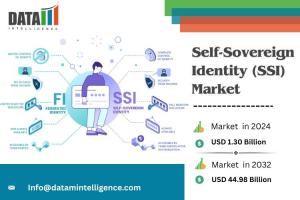Self-Sovereign Identity Market Outlook 2025–2032 | Explosive 84.5% CAGR to $44.98B
The Self-Sovereign Identity (SSI) Market is projected to surge from $1.30B in 2024 to $44.98B by 2032, growing at a remarkable CAGR of 84.5% during 2025–2032.
In today's digital-first world, identity is power. With the rise of data breaches, identity theft, and consumer privacy concerns, the spotlight has shifted to a new model of digital identification: Self-Sovereign Identity (SSI). This approach gives individuals full control over their personal data, allowing them to manage, share, and revoke access to their credentials without relying on centralized authorities.
The Self-Sovereign Identity (SSI) Market Size was valued at US$1.30 billion in 2024 and is projected to grow significantly, reaching around US$44.98 billion by 2032. This expansion represents a robust compound annual growth rate (CAGR) of about 84.5% between 2025 and 2032.
To Download Sample Report: https://datamintelligence.com/download-sample/self-sovereign-identity-market
What’s Driving the SSI Boom?
Several factors are fueling the momentum behind SSI:
Privacy-first mindset: Individuals are no longer comfortable sharing their personal data with multiple third parties. SSI allows for verifiable credentials without compromising privacy.
Regulatory push: Data privacy regulations around the world, like GDPR and CCPA, are forcing organizations to rethink how they store and manage personal data.
Decentralized tech evolution: Blockchain, distributed ledger technologies, and advanced encryption methods are laying the foundation for robust SSI ecosystems.
Rise in digital services: As more services go online, the need for secure, seamless, and portable identity verification is stronger than ever.
Market Growth & Business Landscape
The SSI market is seeing remarkable growth across North America, Europe, and Asia-Pacific. While North America currently holds the lion’s share due to strong tech infrastructure and early adoption, Asia-Pacific is expected to witness the fastest growth in the coming years.
Large corporations and governments are investing heavily in SSI systems. Financial institutions are using it for KYC (Know Your Customer) compliance, while healthcare providers explore it to manage patient records. Tech startups, on the other hand, are developing digital wallets, identity verification APIs, and decentralized apps to enable SSI use at the consumer level.
Industries leading the charge include:
Banking & Financial Services: For frictionless onboarding, fraud prevention, and regulatory compliance.
Healthcare: For secure patient identity management and data exchange.
Education: For issuing and verifying academic credentials.
Government: For digital passports, voting systems, and secure access to public services.
Top Most Leading Companies:
Microsoft Corp
IBM Corporation
DSR Corporation
Voyatek
Dock Labs AG
Okta
Bosch
SAP SE
Validated ID
Netcetera
Market Segmentation:
By Component: Software , Decentralized Identity Management Platforms, Identity Verification Solutions, Blockchain-based Identity Wallets, Others, Services, Consulting Services, Integration & Deployment Services, Support & Maintenance Services, Others
By Identity: Individual Identity , Enterprise Identity, Others
By Deployment Mode: On-Premises , Cloud-Based
By Application: Banking, Financial Services & Insurance (BFSI) , Government & Public Sector, Healthcare & Life Sciences, Retail & E-commerce, IT & Telecom, Travel & Hospitality, Education & Research, Supply Chain & Logistics, Others
Latest News from the USA
The United States continues to play a central role in shaping the SSI landscape. Several major developments have recently surfaced:
Government Involvement: The U.S. government has initiated pilot programs to test decentralized identity systems for federal employee access and benefits distribution. Departments like Homeland Security and Veterans Affairs are actively testing blockchain-based ID solutions.
Private Sector Innovation: American tech giants and fintech startups are collaborating to develop open SSI standards. Some are working on digital wallets that store driver's licenses, health records, and even social security credentials securely on users' mobile devices.
State-Level Progress: States like California and Texas are exploring the use of verifiable digital IDs for state services. Digital driver's licenses, for example, are being rolled out with SSI principles in mind, offering residents greater control over what data they share and with whom.
Cybersecurity Boost: With increasing cyber threats, companies are now investing in SSI as a part of zero-trust architecture, ensuring that identities are verifiable without relying on centralized databases that can be hacked.
Latest News from Japan
Japan is emerging as a forward-thinking player in the SSI ecosystem, thanks to its tech-savvy population and strong government support.
National Digital Identity Strategy: Japan has introduced a roadmap to move from traditional identity systems toward decentralized frameworks. As part of its "Digital Garden City" vision, the government aims to empower citizens with tools to manage their personal data.
Partnerships with Tech Firms: Leading Japanese companies are collaborating with blockchain startups to build interoperable SSI platforms. From smart city projects to digital health initiatives, Japan is integrating SSI into future public service infrastructure.
Financial Sector Adoption: Major banks in Japan are exploring the use of SSI for customer onboarding and digital payment systems. By leveraging decentralized identity, these institutions are aiming to reduce fraud and improve user convenience.
Smart Cities & SSI: In cities like Fukuoka and Osaka, local governments are testing SSI for access control, transportation systems, and public benefits. The idea is to create seamless, secure urban experiences powered by self-managed digital identities.
Experts Thoughts:
The Self-Sovereign Identity market isn’t just a trend it’s the foundation for a safer, more private, and more efficient digital future. As consumers demand more control over their data and businesses seek secure, user-friendly solutions, SSI stands at the intersection of trust and technology.
The coming years will see further collaboration among governments, enterprises, and tech developers to create open standards, scalable platforms, and cross-border solutions. With rising awareness and adoption, SSI is well on its way to becoming the global standard for digital identity.
Here are the Latest Reports By DataM Intelligence:
Identity and Access Management Market Size
Identity as a Service Market Size
Sai Kiran
DataM Intelligence 4Market Research
+1 877-441-4866
Sai.k@datamintelligence.com
Visit us on social media:
LinkedIn
X
Legal Disclaimer:
EIN Presswire provides this news content "as is" without warranty of any kind. We do not accept any responsibility or liability for the accuracy, content, images, videos, licenses, completeness, legality, or reliability of the information contained in this article. If you have any complaints or copyright issues related to this article, kindly contact the author above.
Guinness World Record Most Variations of Tiramisu in the World
Top Digital Marketers Use 'The Tipping Point' to Shift Public Opinion and Drive Change in Industry and Workplace Culture
Paresthesia Treatment Market: Heading for $7.9 Billion by 2031 — and New Therapies Are Already Reshaping the Landscape
Więcej ważnych informacji
 Jedynka Newserii
Jedynka Newserii

 Jedynka Newserii
Jedynka Newserii

Konsument

Proces deregulacji nie dotyczy branży tytoniowej. Jest propozycja kolejnej ustawy w ciągu kilku miesięcy
Najpierw wprowadzenie podatku akcyzowego na saszetki nikotynowe, potem propozycja przepisów, które zmierzają do wycofania tych produktów z rynku – przedstawiciele środowisk biznesowych podkreślają, że przygotowywane przez resort zdrowia przepisy wprowadzają chaos legislacyjny w branży tytoniowej. To tym bardziej dziwi przedsiębiorców, że stoi w opozycji do prowadzonego przez rząd procesu deregulacji w gospodarce. W dodatku może mieć negatywne skutki dla budżetu państwa i doprowadzić do skokowego wzrostu szarej strefy.
Bankowość
Grzyby rozkładające tekstylia nagrodzone w konkursie ING. 1 mln zł trafi na innowacyjne projekty dla zrównoważonych miast

Firma Myco Renew, która opracowała technologię rozkładającą tekstylia za pomocą grzybów, została laureatem siódmej edycji Programu Grantowego ING. Motywem przewodnim konkursu skierowanego do start-upów i młodych naukowców był tym razem zrównoważony rozwój miast i społeczności. Łącznie na nagrodzone innowacyjne projekty trafił 1 mln zł. Wśród nich są także bezzałogowe statki powietrzne dostarczające defibrylatory czy system do zbierania deszczówki w blokach.
Prawo
Trwają próby wzmocnienia dialogu społecznego. Niespokojne czasy wymuszają większe zaangażowanie społeczeństwa w podejmowanie decyzji

Według zapowiedzi szefowej Komisji Europejskiej Ursuli von der Leyen głos partnerów społecznych i dialog społeczny będą stały w centrum procesu decyzyjnego w Europie. Taki jest cel podpisanego w marcu Paktu na rzecz europejskiego dialogu społecznego. Potrzeba wzmocnienia głosu społeczeństwa jest również podkreślana na forum krajowym. Rząd planuje reformę Rady Dialogu Społecznego, by usprawnić pracę tej instytucji, a przedsiębiorcy wzywają do rzetelnego konsultowania ze stroną społeczną ustaw, które wychodzą z rządu.
Partner serwisu
Szkolenia

Akademia Newserii
Akademia Newserii to projekt, w ramach którego najlepsi polscy dziennikarze biznesowi, giełdowi oraz lifestylowi, a także szkoleniowcy z wieloletnim doświadczeniem dzielą się swoją wiedzą nt. pracy z mediami.








.gif)

 |
| |
| |
|